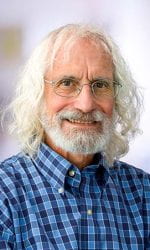Philip D. Greenberg, M.D.
 PROFESSOR OF MEDICINE (ONCOLOGY) AND IMMUNOLOGY
PROFESSOR OF MEDICINE (ONCOLOGY) AND IMMUNOLOGY
Dr. Greenberg graduated from Washington University with a degree in biology. He received his M.D. summa cum laude from the State University of New York, Downstate Medical Center, in 1971. After completing postdoctoral training at the University of California at San Diego, he joined the Fred Hutchinson Cancer Center and the Division of Oncology at the University of Washington in 1976. He is currently the Head of the Program in Immunology at the Fred Hutchinson Cancer Center.
CONTACT1100 Fairview Ave. N.,
P.O. Box 19024
Mail Stop: D3-100
Seattle, WA 98109-1024
Phone: 206-543-8306
Fax: 206-221-2796
|
RESEARCH AREASMolecular Immunology LAB MEMBERS |
LABACCEPTING NEW STUDENTS: NO PUBMED |
RESEARCH
Dr. Greenberg’s laboratory is involved in studies elucidating the immunobiology of host T cell responses to infectious viruses and transformed cells. Analysis of T cell responses to pathogenic viral infections and tumors has demonstrated that reactive T cells are often rendered anergic or dysfunctional as a consequence of encounter with the antigen, and the basis for these defects are being explored and molecular strategies to restore and augment T cell function via genetic modification of T cells with vectors expressing novel proteins, dominant negative proteins, or RNAi are being evaluated. The mechanisms of tolerance to tumor antigens that are over-expressed pro-oncogenic self-proteins are being examined in transgenic mouse models that express tumor-derived proteins of known immunogenicity under the control of tissue-specific promoters- these models are making it possible to isolate and track antigen-specific tolerant cells, to use technologies such as gene expression arrays to identify abnormalities in tolerant T cells, and to begin testing molecular strategies for correcting defects. Immunity to human pathogenic viruses is being studied with the goal of defining methods to generate or augment protective immune responses.
These studies include the development of transgenic/knock-in mice in which human genes are being expressed to create models that better typify human immune responses, and these mice are being used to evaluate and improve the design of candidate HIV vaccines. Previous studies of human CMV immunobiology led to a clinical trial in which immunosuppressed leukemia patients at high risk for fatal CMV infection were infused with CMV-specific cytolytic T cell clones. The clones had been previously selected for recognition of an immunodominant protective epitope and expanded to large numbers in vitro, and this trial demonstrated that T cell transfer can reconstitute immunity in humans and provide protection from disease. This adoptive therapy approach with cloned T cells of known function and specificity is now being pursued to both elucidate the immunobiology of human malignancies and infections and to develop novel immune-based therapies. Clinical trials of adoptive T cell therapy are now underway in patients with leukemia. Methods to modulate the effector functions, survival, target avidity, and localization of T cells, and to impart desired antigen specificity are being developed using retroviral-mediated gene transfer, and such engineered T cell clones are now being evaluated in mouse models and will soon be tested in treatment of human disease.
PUBLICATIONS
- Stone JD, Aggen DH, Chervin AS, Narayanan S, Schmitt TM, Greenberg PD, Kranz DM (May 2011) Opposite Effects of Endogenous Peptide-MHC Class I on T Cell Activity in the Presence and Absence of CD8., Journal of immunology (Baltimore, Md. : 1950), 186 (9), 5193-200
- Pufnock JS, Cigal M, Rolczynski LS, Andersen-Nissen E, Wolfl M, McElrath MJ, Greenberg PD (Apr 2011) Priming CD8+ T cells with dendritic cells matured using TLR4 and TLR7/8 ligands together enhances generation of CD8+ T cells retaining CD28., Blood
- Chapuis AG, Casper C, Kuntz S, Zhu J, Tjernlund A, Diem K, Turtle CJ, Cigal ML, Velez R, Riddell S, Corey L, Greenberg PD (Mar 2011) HIV-specific CD8+ T cells from HIV+ individuals receiving HAART can be expanded ex vivo to augment systemic and mucosal immunity in vivo., Blood
- Wölfl M, Merker K, Morbach H, Van Gool SW, Eyrich M, Greenberg PD, Schlegel PG (Feb 2011) Primed tumor-reactive multifunctional CD62L+ human CD8+ T cells for immunotherapy., Cancer immunology, immunotherapy : CII, 60 (2), 173-86
- Kuball J, de Boer K, Wagner E, Wattad M, Antunes E, Weeratna RD, Vicari AP, Lotz C, van Dorp S, Hol S, Greenberg PD, Heit W, Davis HL, Theobald M (Feb 2011) Pitfalls of vaccinations with WT1-, Proteinase3- and MUC1-derived peptides in combination with MontanideISA51 and CpG7909., Cancer immunology, immunotherapy : CII, 60 (2), 161-71
- Rhee EG, Blattman JN, Kasturi SP, Kelley RP, Kaufman DR, Lynch DM, La Porte A, Simmons NL, Clark SL, Pulendran B, Greenberg PD, Barouch DH (Jan 2011) Multiple innate immune pathways contribute to the immunogenicity of recombinant adenovirus vaccine vectors., Journal of virology, 85 (1), 315-23
- Stromnes IM, Blattman JN, Tan X, Jeevanjee S, Gu H, Greenberg PD (Oct 2010) Abrogating Cbl-b in effector CD8(+) T cells improves the efficacy of adoptive therapy of leukemia in mice., The Journal of clinical investigation, 120 (10), 3722-34
- Fowler CC, Pao LI, Blattman JN, Greenberg PD (Sep 2010) SHP-1 in T cells limits the production of CD8 effector cells without impacting the formation of long-lived central memory cells., Journal of immunology (Baltimore, Md. : 1950), 185 (6), 3256-67
- Lee SH, Yun S, Piao ZH, Jeong M, Kim DO, Jung H, Lee J, Kim MJ, Kim MS, Chung JW, Kim TD, Yoon SR, Greenberg PD, Choi I (Jul 2010) Suppressor of cytokine signaling 2 regulates IL-15-primed human NK cell function via control of phosphorylated Pyk2., Journal of immunology (Baltimore, Md. : 1950), 185 (2), 917-28